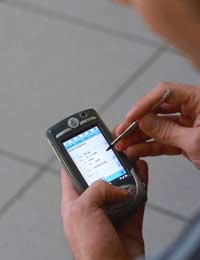PDA or Smartphone: Adequate Substitute for a Laptop?

It’s the digital age. Technology has become all-pervasive. Many - perhaps most - jobs can’t be done properly without it. For those working abroad, this often presents a problem. If a computer is really indispensable to the work they have to do, unwieldy laptops are typically lugged around, hampering mobility. In recent years, miniature devices like smartphones and PDAs have become more powerful. But are they really adequate substitutes for a laptop?
Below we present an overview of the major smartphone/PDA systems and their capabilities.
Pocket PC
The Pocket PC was dreamed up by Microsoft and designed as a miniature version of Windows. The operating system includes cut-down versions of Microsoft favourites like Word, Excel and Outlook as standard.Pocket PCs use a stylus-based input system on their touch-screen interfaces. Text is entered by tapping on an on-screen keyboard; some of the more recent models feature an integrated miniature physical keyboard instead.
Portable keyboards which can be folded up into a small size can be used in conjunction with Pocket PCs, connecting either via Bluetooth or infra-red. This increases the usability of the devices substantially for work-related tasks.
Although the Pocket PC is a little dated these days, it’s still a decent “home away from home”-style workhorse for basic business applications.
iPhone\iPod Touch
There is a wide range of applications available for Apple’s device, mostly not serious business applications, however.The device has a touch sensitive screen and uses an on-screen keyboard for text input. Most people find it fiddly and difficult to use. The on-screen keys are just too small in relation to fingers. It’s alright for the occasional email but you definitely would not want to type up a long report with it.The iPhone\iPod Touch lacks serious business-level applications. Even basic file portability and viewability between the iPhone\iPod Touch is limited. For example, the general consensus is that the simplest way to get a Microsoft Word file onto the device is to email it to yourself.
Apple also imposes restrictions on what programs running on the device can do, some of which limit its utility for business purposes. For example, it would be impossible to have a program constantly running in the background checking to see if you had received new email. Although both the iPhone and iPod Touch have some built-in Bluetooth capability, access to it is heavily restricted by Apple. In practice, this means that the interesting ecosystem of third-party devices (such as keyboards or mice) which has emerged around the Pocket PC will not be there for the iPhone\iPod Touch.
The iPhone\iPod Touch is a sexy and fun little gizmo. Unfortunately, for most purposes, it doesn’t really cut it as a serious business tool.
Blackberry
For years, Blackberry has marketed its products as the devices for emailing on the move, and has carved out a large subscription base among executives and companies with large mobile workforces. Among the Blackberry’s more famous devotees are Al Gore and Barack Obama. The Blackberry was the first major handheld to offer what are called push-email capabilities. Conventional email works by checking with the email server – polling - every so often to see whether any new emails have arrived. This means you don’t get to know about new emails right away. With push-email, by contrast, you can be notified almost instantly.Blackberrys have always been characterised by interface simplicity, an integrated keyboard and a focus on email and calendaring applications. That remains true today, even though the latest models have adopted the usual bells and whistles of any modern handheld, such as touch screens and web-browsing abilities. If email is critical to your work, and you need to deal with a large volume of it while on the move, the Blackberry remains a good choice.


Re: PDA or Smartphone: Adequate Substitute for a Laptop?
Good afternoon I am interested in your system and would like to have more information including…
Re: Remotely Monitoring Your Home While Abroad
I am planning to be out of US for 5 mo. Will I be able to see my security cameras if I turn off my PC at home?
Re: What Happens to My NI Payments When I Emigrate?
Could tell me ,my sister died in Canada last year she emanated from England in1968 , she went when she…
Re: Can my Wages be Paid into a UK Bank Account?
Hello I am UK National and I have been a non-resident landlord for several years. I receive UK rental…
Re: How to Find a Job Abroad
I am 36years.l am looking for an office assistant job in Ireland
Re: Can my Wages be Paid into a UK Bank Account?
I work in the middle East and receive a tax free salary, I spend most of my time off in Spain which is around…
Re: How to Find a Job Abroad
Seeking employment abroad Trade Tested Welder please help
Re: Remotely Monitoring Your Home While Abroad
I am live in uk. I have a home in Bangladesh.i want to install cctv or wifi cam in Bangladesh. which wifi cam…
Re: Remotely Monitoring Your Home While Abroad
I live in Australia Sydney and I had my cctv set up in Sri Lanka when I was there but when I came back to…
Re: Remotely Monitoring Your Home While Abroad
I live in the uk, but i have a home in bangladesh and would like cctv cameras but dont know which is best to see…